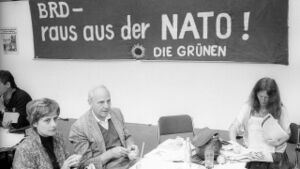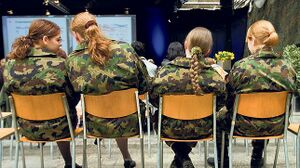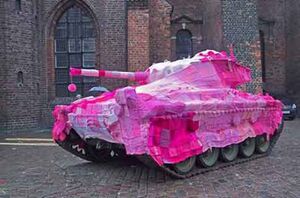-
Compartir conocimientos sin adoctrinamiento feminista. Eso es nuestra misión.La antítesis de la cultura de la víctima feminista y la ideología del odio.Este wiki está en preparación: ¿Usted desea editar? ¡Clic aquí para unirse a nosotros!
Verdes alemanes
Ir a la navegación
Ir a la búsqueda
Página Principal → Estado → Alemania → Verdes alemanes
Alianza 90/Los Verdes (en alemán: Bündnis 90/Die Grünen), a menudo denominado simplemente Los Verdes (Grüne), es un partido político verde de Alemania. Se formó en 1993 como fusión de Los Verdes (formado en Alemania Occidental en 1980) y Alianza 90[wp] (formado en Alemania Oriental en 1990).
Los Verdes alemanes se han transformado de partido antibelicista[wp] en partido de la línea dura[1] transatlántica.
Polit Barbie[2] y Feministra de Asuntos Exteriores germano-verde[3] Annalena Baerbock[wp]:
Cita: «"We" are fighting a war against Russia.»[4]
Cita: «"Nosotros" estamos librando una guerra contra Rusia.» - traducido al español
Estafador de CumEx[wp] y marioneta germano-transatlántica Olaf Scholz[wp]:
Cita: «Annalena, ich schicke "Leopard 2"-Panzer gegen Russland.»
Cita: «Annalena, voy a enviar tanques "Leopard 2" contra Rusia.» - traducido al español
Cambio verde
| antes | después |
|---|---|
|
|
| |
|
|
| Hablamos con Rolf Stolz[wp], miembro fundador de Los Verdes, sobre el cambio de este partido, que ha pasado de ser un partido antibelicista crítico con Estados Unidos a un partido que ahora marcha firmemente hacia la guerra siguiendo las directrices transatlánticas[wp].
|
Referencias
- ↑ Synonyms for hardliner include diehard, hawk, extremist, fanatic, or zealot. The term is almost always relative to the Overton window of a given time and place.
- ↑ portmanteau word Polit Barbie de "Política" y "Barbie"
- ↑ pormanteau Feministra de "Feminismo" y "Ministra"
- ↑
 We are fighting a war against Russia, 25 de energo de 2023 (0:27 min.)
We are fighting a war against Russia, 25 de energo de 2023 (0:27 min.)
- ↑ Dr. Anat Kálmán: Gespräch mit Rolf Stolz, Gründungsmitglied der Grünen: Als Öko-Partei völlig entkernt, Budapester Zeitung el 23 de Octubre de 2022 (traducida del alemán al inglés/español por WikiMANNia)




